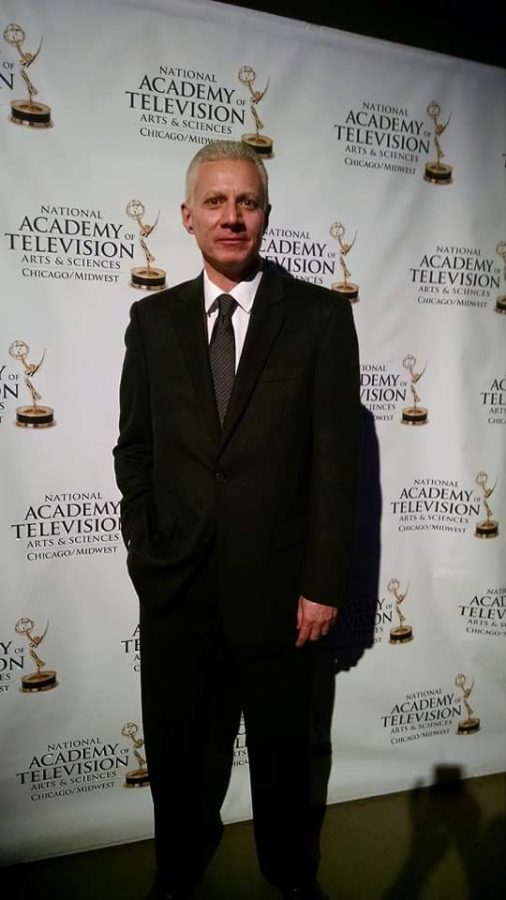For Michael Carrera-Grecco, life without passion is meaningless
Actor and professor Michael Carrera-Grecco underlines the qualities needed in becoming an actor and some of the issues you might face once in the industry.
February 13, 2022
Lights! Camera! Action! Or for Michael Carrera, recent days have consisted of taking attendance. Love for his craft and his teaching proceeds all else. Although he strictly wears head-to-toe neutrals, Carrera has lived a colorful life in the acting and performing arts industry.
Carrera used to boogie down at the “discos” (clubs) in the 70s and 80s as a teenager since his first perfected talent was tap dancing. He didn’t have eyes for acting until Pacino, DeNiro, Pesci and Stallone released main character, blockbuster films. Feeling as if you lived vicariously through the actor in the duration of the performance is the art of acting. Good acting calls for laughs and smiles from the audience. Great acting will leave no dry eyes. He found this soulful interaction later in his career when he played Anne Frank’s father in a play.
Carrera was raised in Brooklyn by a single mother, and with that came uncertainty when he graduated high school. His mother was hesitant about allowing him to pursue a career in acting since only the top one percent of the industry can live without financial worry. She wanted Carrera to take safe routes for stability, but Carrera is naturally a force to be reckoned with and pursued his collegiate and graduate studies in acting. Once he seized roles left and right in theatre shows, his mom began showing her unparalleled support. Once joining the actor’s union, he took on an additional surname, Grecco, now known as Michael Vincent Carrera-Grecco.
Carrera believes the industry cultivates ageism and a lack of female command. This creates an impermissible border between directors, casting directors and potential talent.
“Hollywood is run by white men, and that has created a certain culture, whether it’s good, bad or otherwise it has affected how the industry has developed,” Carrera said. “The best stage managers I’ve worked with have been women.”
Youth is a winning factor, and if you don’t have that, then you need a lucky star. It is difficult to land auditions, since most entertainment is geared towards the 40s and under demographic.
“The camera loves beauty and for many of us who are not beautiful we are limited in our roles, and that will always be the case,” Carrera said. “We have this term called ‘typecasting’ which is when an actor does not look or act stereotypical to their ethnicity. I remember being told I didn’t look Italian enough.”
This past decade Carrera set his sight on a kid’s learning show that was essentially a grassroots, close-knit production.
“We started with nothing, there was barely even a budget” Carrera said. “No one knew how to make a children’s show and suddenly after filming without any form of distribution, PBS picks it up and it gets nominated for an Emmy award in 2016.”
Unfortunately, the show did not get signed for another season.
“That’s the strangeness and absurdity of the business,” Carrera said. “Even when you think you have something well done, you put out a good product, and people are responding, there is still not guarantee because you’re at the whim of so many people unless you create your own world.”
When away from rehearsing scripts, Carrera mellows down to personalized interactions with his students. As an adjunct professor at Iona, he takes pride in teaching all aspects of theatre and in turn learning from students. Carrera is greatly appreciative of the unique personalities, stories and new generational knowledge his students have to offer.
Carrera’s time is taken up by creating lesson materials and going on auditions that his manager in Los Angeles secures for him. This leaves time for barely anything else. Not having a family or a long-time partner was a conscious decision made when Carrera first experienced life as an actor.
“If there is something else you do equally as well or just as passionate about, then do it because you’re more likely to be lucrative in that,” Carrera said. “Ask yourself: Can I live without this? If the answer is ‘yes,’ then you have to sacrifice a lot of things normal people take for granted. You have to study, train and always be on point because there are many others competing.”
Once Carrera commits to teaching for the semester, he tries not to let casting calls supplant his curriculum. However, if a worthwhile opportunity arises, he will put his acting career first. One day when Carrera wins his Emmy, Oscar or Tony award, we hope he will give Iona College a special shoutout in his acceptance speech.








